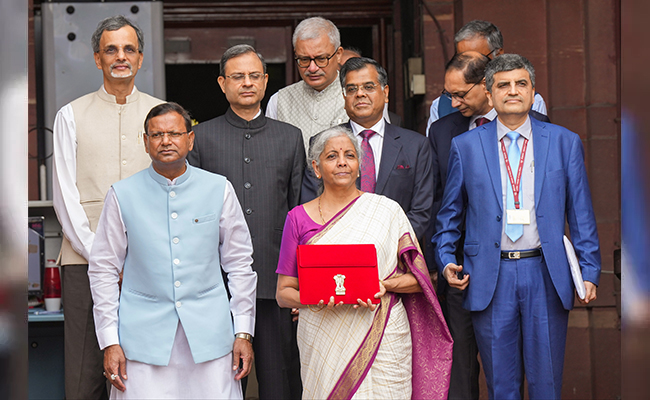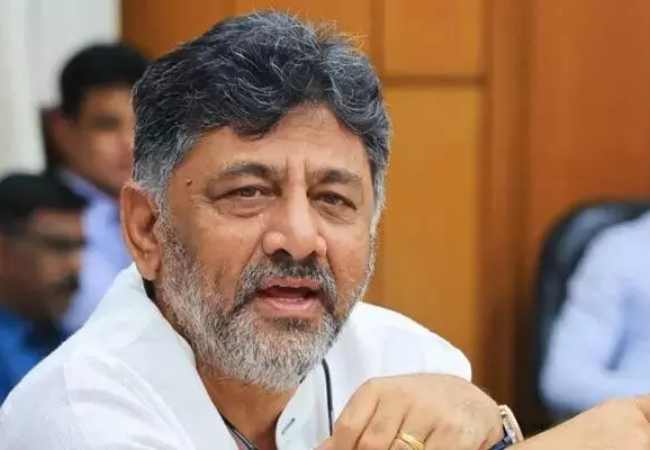New Delhi: Finance Minister Nirmala Sitharaman presents first Budget of the third consecutive Modi government
Here are the live and important updates of Union Budget 2024:
12:25 AM: Changes in the new income tax: 0-3 Lakhs: Nil; 3-7 lakh: 5%; 7-10 lakhs: 10%; 10-12 lakhs: 15%; 12-15 lakhs: 20%; Above 15 lakhs: 30%
12:20 AM: TDS rate on e-commerce operators reduced from 1% to 0.1%, says FM Nirmala Sitharaman
12:20 AM: Government reduces basic customs duty on mobile phones, mobile chargers to 15%
12:15 PM: PM Gram Sadak Yojana's phase 4 to be launched
12:15 PM: street markets (100 haats) to be set up in select cities
12:15 PM: water supply will be promoted in partnership with state govts
12:15 PM: Govt to undertake comprehensive review of Income Tax Act to make it easy to read, says FM.
12:15 PM: Custom duties on gold, silver reduced to 6%
12:10 PM: Fiscal deficit estimated at 4.9% of GDP, The aim is to reach the deficit below 4.5%: FM Sitharaman
12:10 PM: Govt announces loans up to Rs 10 lakh for higher education in domestic institutions
12:05 PM: Govt proposes reduction in basic customs duty on certain brood stocks, shrimps and fish feed to 5pc: FM.
12:05 PM: GST has decreased tax incidence on common man, reduced logistic cost for industry, it is a success of vast proportion: FM in Lok Sabha.
12:00 PM: Free electricity upto 300 units per month for 1cr household under solar panel scheme
12:00 PM: Rs 2 lakh crore allocated to employ 4.1 crore youth over next 5 years
11:55 AM: Govt to provide assistance to Odisha for development of tourism: FM in Lok Sabha.
11:55 AM: Govt to provide Rs 11,500 crore to Bihar for flood mitigation, says FM.
11:50 AM: Finance Minister proposes Rs 1.5 lakh cr long-term interest-free loans to support states towards infra development.
11:50 AM: Finance Minister Nirmala Sitharaman announces a scheme to provide internship opportunities to one crore youths at 500 top companies across the country over the next five years. Each intern will receive a monthly allowance of ₹5,000 and a one-time assistance of ₹6,000.
11:45 AM: 2.66 lakh crore for rural development
11:45 AM: Govt will develop digital public infra application in 7 areas, including credit, MSME service delivery: FM in Lok Sabha.
11:40 AM: IBC has resolved more than 1,000 cases resulting in realisation of Rs 3.3 lakh cr to creditors, says FM.
11:40 AM: Govt proposes development of digital public infra application for productivity gains, biz opportunities and innovation by private sector: FM
11:37 AM: Govt to launch auction of first offshore mining blocks: FM announces in Budget.
11:37 AM: Govt will facilitate dormitory type rental housing for industrial workers in PPP mode: FM
11:37 AM: Govt to promote investment-ready industrial parks in 100 cities: FM in Budget
11:36 AM: Rs 26,000 crore to be allocated for highways in Bihar
11:35 AM: Special package of ₹15,000 crores announced for Andhra Pradesh.
11:33 AM: Nirmala Sitharaman announces major financial packages for Bihar and Andhra Pradesh.
11: 32 AM: "The request from the Bihar government for external assistance from multilateral development banks will be expedited," says Nirmala SItharaman
11:3O AM: Nirmala Sitharaman announces employment-linked skilling schemes as part of the PM's package, emphasizing enrolment in the EPFO and recognizing first-time employees. "First-timers will receive one month's wage upon entering the workforce in all formal sectors," she stated. A direct benefit transfer (DBT) of one month's salary, up to ₹15,000, will be provided in three instalments. The eligibility limit for this benefit is a salary of ₹1 lakh per month, and it is expected to benefit 2.1 lakh youths.
11:28 AM: Nirmala Sitharaman announces financial support for higher education loans up to ₹10 lakh.
11:25 AM: The budget will prioritize nine key areas: productivity and resilience in agriculture by initiating 1 crore farmers into natural farming over the next two years, employment and skilling with a focus on job creation and skill development, improved human resources and social justice, strengthening the manufacturing and service sectors, advancing urban infrastructure and development, ensuring stable and secure energy supply, investing in infrastructure projects, promoting innovation, research, and development, and implementing next generation reforms to drive future growth.
11: 23 AM: India's inflation remains low and stable, approaching the 4% target: Nirmala Sitharaman
11:2O AM: The budget will prioritize nine key areas: productivity and resilience in agriculture by initiating 1 crore farmers into natural farming over the next two years, employment and skilling with a focus on job creation and skill development, improved human resources and social justice, strengthening the manufacturing and service sectors, advancing urban infrastructure and development, ensuring stable and secure energy supply, investing in infrastructure projects, promoting innovation, research, and development, and implementing next generation reforms to drive future growth.
11:15 AM: India's inflation remains low and stable, approaching the 4% target: Nirmala Sitharaman
11:10 AM: Union Finance Minister Nirmala Sitharaman announces that the budget will prioritize employment, skilling, Micro, Small, and Medium Enterprises (MSMEs), and the middle class.
11:00 AM: Finance Minister Nirmala Sitharaman begins presentation of her 7th Union Budget in Lok Sabha.
Let the Truth be known. If you read VB and like VB, please be a VB Supporter and Help us deliver the Truth to one and all.
Bengaluru (PTI): Karnataka has proposed a new Information Technology Policy for 2025–2030, offering extensive financial and non-financial incentives aimed at accelerating investments, strengthening innovation and expanding the state's tech footprint beyond Bengaluru.
The Karnataka Cabinet gave its nod to the policy 2025–2030 with an outlay of Rs 445.50 crore on Thursday after the Finance Department accorded its approval.
The policy introduces 16 incentives across five enabler categories, nine of which are entirely new, with a distinctive push to support companies setting up or expanding in emerging cities.
Alongside financial support, the government is also offering labour-law relaxations, round-the-clock operational permissions and industry-ready human capital programmes to make Karnataka a globally competitive 'AI-native' destination.
According to the policy, units located outside Bengaluru will gain access to a wide suite of benefits, including research and development and IP creation incentives, internship reimbursements, talent relocation support and recruitment assistance.
The benefits also include EPF reimbursement, faculty development support, rental assistance, certification subsidies, electricity tariff rebates, property tax reimbursement, telecom infrastructure support, and assistance for events and conferences.
Bengaluru Urban will receive a focused set of six research and development and talent-oriented incentives, while Indian Global Capability Centres (GCCs) operating in the state will be brought under the incentive net.
Incentive caps and eligibility thresholds have been raised, and the policy prioritises growth-focused investments for both new and expanding units.
Beyond incentives, the government focuses on infrastructure and innovation interventions.
A flagship proposal in the policy is the creation of Techniverse -- integrated, technology-enabled enclaves developed through a public-private partnership model inside future Global Innovation Districts.
These campuses will offer plug-and-play facilities, artificial intelligence and machine learning and cybersecurity labs, advanced testbeds, experience centres, and disaster-resistant command centres.
There will also be a Statewide Digital Hub Grid and a Global Test Bed Infrastructure Network, linking public and private research and development, and innovation facilities across Karnataka.
The government has proposed a Women Global Tech Missions Fellowship for 1,000 mid-career women technologists, an IT Talent Return Programme to absorb experienced professionals returning from abroad, and broad-based skill and faculty development reimbursements.
Shared corporate transport routes in Bengaluru and tier-two cities will be designed with Bengaluru Metropolitan Transport Corporation and other transport entities to support worker mobility.
The government said the policy is the outcome of an extensive research and consultation process involving TCS, Infosys, Wipro, IBM, HCL, Tech Mahindra, Cognizant, HP, Google, Accenture and NASSCOM, along with sector experts and stakeholder groups.
It estimates an outlay of Rs 967.12 crore over five years, comprising Rs 754.62 crore for incentives and Rs 212.50 crore for interventions such as Techniverse campuses, digital grid development, global outreach missions and talent programmes.





